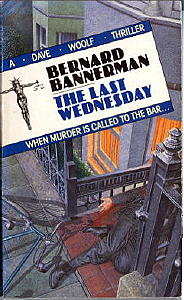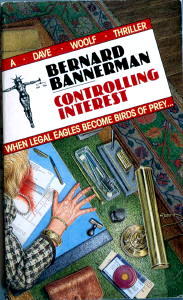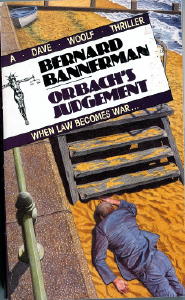Tue 3 Jul 2007
The Compleat BERNARD BANNERMAN.
Posted by Steve under Authors , Bibliographies, Lists & Checklists , Crime Fiction IVNo Comments
I’m always on the lookout for previously unknown and/or unidentified private eyes, the fictional variety. Kevin Burton Smith keeps a pretty good list on his Thrilling Detective website, but he doesn’t have them all. I’ve helped in adding a few, and I thought I had another one when I came across the books of Bernard Bannerman, who chronicled the adventures of one Dave Woolf, a London-based PI about whom I’ll tell you more in a minute.
It turns out, however, that Kevin has heard of Dave Woolf. He’s listed as a PI on his website, but only by name. There’s no page there for him, yet.
Here’s what Bannerman’s entry looks like in Crime Fiction IV, by Allen J. Hubin:
BANNERMAN, BERNARD; pseudonym of Andrew Arden (1948- )
* Controlling Interest (n.) Sphere 1989 [Dave Woolf; London]
* The Last Wednesday (n.) Sphere 1989 [Dave Woolf; London]
* The Judge’s Song (n.) Sphere 1991 [Dave Woolf; London]
* Orbach’s Judgment (n.) Sphere 1991 [Dave Woolf; London]
Under his own name, Andrew Arden has one mystery novel to his credit:
ARDEN, ANDREW (1948- ); see pseudonym Bernard Bannerman
* The Motive Not the Deed (n.) Talmy Franklin 1975 [London]
I don’t know anything about this book, but from the Internet, I have learned more about the author himself. Taken from his website:
Fiction — the novels which appeared under his own name:
* The Motive Not The Deed, 1974
* No Certain Roof, 1984 [Landlord of working-class family wants to turn their house into flats.]
* The Object Man, 1987
* The Programme, 2001 [A law firm gets mixed up with a quasi-religious cult.]
If you may have gotten the feeling that legal matters have something to do with the cases that Dave Woolf works on, you’d be right. I hasten to add that I’ve not read any of them yet, but I’ve recently put together a complete set of his adventures, as told by Bernard Bannerman.
Each of the first two books mentions the other as a selling point, so perhaps they came out at the same time. But one has a lower publisher’s number than the other, so I’ll go with that one as the first of the two. (The same is true for the second pair of books.)
Quoting from the back cover of each of the books:
THE LAST WEDNESDAY. Sphere 0382, pbo, 1989.

No one falls out as viciously, as painfully or as messily as lawyers. Jack Nicholas, left-wing barrister, was supposed to have died in an accident. Drunk, said the coroner. Murdered, said his mother. Enter Dave Woolf, ex-solicitor, boozer and down-at-heel private eye.
Even before Woolf starts asking questions, he finds that he is investigating not one death, but the wholesale despatch of Jack Nicolas’ erstwhile colleagues. There is very little for Woolf to go on – as he treks through the glitz and sleaze of London, through France and Norway in search of an elusive German – other than the apparent coincidence that all the deaths had occurred on the last Wednesday of every month.
CONTROLLING INTEREST. Sphere 0383, pbo, 1989.

“The body of a woman solicitor was discovered by staff arriving yesterday morning at the Holborn offices of the prestigious London solicitors, Mather’s. Katrina Parkhurst, 32, has been shot. Police are investigating.”
A murder on the premises is bad news for a law firm. It discourages clients. It also discourages recruits which is damaging to a firm like Mather’s with a reputation, a lot of clients, but very few partners. But, as Dave Woolf, one-time lawyer, part-time boozer and (almost) full-time private eye realizes, a thorough professional would prefer a murder to a leak any day of the week. Dead men can’t leak information on gambling debts, treachery, the darker side of freemasonry, and a dodgy business dating back forty years …
THE JUDGE’S SONG. Sphere 0520, pbo, 1991.

It was, as Dave Woolf said, “the sort of thing that doesn’t happen in England.” High-count corruption, gangsters, fire-bombs and a bit of murder on the side – all of it against the backdrop of a family drama raging through London, the West Country and the South of France.
It’s not the sort of thing that solicitors ought to be investigating. But Woolf is not ordinary solicitor. Back in the legal fold after a spell as a private eye, he’s roped into a spot of detection for the usual reason – an irresistible fee. Sustained by hefty slugs of Southern Comfort, Camels and his new Aussie sidekick, he’s ready to haul a few skeletons out of family cupboards. The trouble is, they’re still alive …
ORBACH’S JUDGEMENT. Sphere 0521, pbo, 1991.

Dave Woolf, solicitor and private eye, has had respectability thrust upon him. He’s also been saddled with the most sensational case of his career.
High Court Judge Sir Russell Orbach is a pillar of the establishment and a doting guardian to the orphaned Frankie. In public, that is. In private, according to Frankie’s famous half-sister, he’s a murderer. What’s more, she’s going to say so n her forthcoming autobiography. Would Woolf, asked the petrified publisher, check up on this bizarre accusation?
It’s just up Woolf’s street; he specialises in investigating the misconduct of members of the legal profession. It’s sometimes like biting the hand that feeds you; but when that hand is adept at bullying, blackmail and bundling bodies into the ocean, it’s Woolf who’s in danger of being bitten … and badly.
Comments: First of all, I do like that last line. Secondly, as I mentioned earlier, I’ve not read these, but I have skimmed through them. Not well enough, I admit, to identify Woolf’s new Aussie sidekick in The Judge’s Song, but enough to know that these are books that are not likely ever to be published in the US, a country whose inhabitants have no idea what a solicitor is, nor how he or she is different from a barrister.
My impression is, and I could be wrong, is that these books are like the rough-and-tumble adventures of Jonathan Gash’s Lovejoy capers, only with a backdrop of courtroom drama and stodgy legal wrangling rather than the much more dodgy antiques business. More reliable input would be welcome.